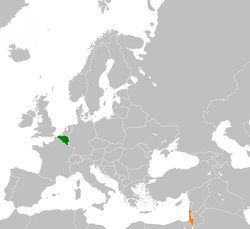Belgium–Israel relations
 | |
Belgium |
Israel |
|---|---|
Belgium–Israel relations are the bilateral relations between Belgium and Israel. Belgium voted in favor of the United Nations Partition Plan for Palestine in 1947 and recognized the State of Israel on January 15, 1950. Belgium has an embassy in Tel Aviv,[1] and Israel has an embassy in Brussels.[2]
In February 2010, a plaque honoring King Albert I, husband of Elizabeth of Bavaria, was unveiled at Albert Square in Tel Aviv in the presence of the Tel Aviv mayor Ron Huldai and Ambassador Bénédicte Frankinet.
Country comparison
| Belgium | Israel | |
|---|---|---|
| Flag | 
|

|
| Population | 11,420,163 (2018) | 8,904,280 (2018)[3] |
| Area | 30,528 km2 (11,787 sq mi) | 20,770 km2 (8,019 sq mi) |
| Population density | 372/km2 (963/sq mi) | 403/km2 (1,044/sq mi) |
| Capital | Brussels | Jerusalem |
| Largest city | Antwerp 520,504 (1,200,000 Metro) | Jerusalem 901,302 (1,253,900 Metro) |
| Largest metro area | Brussels 2,120,000 | Tel Aviv-Yafo 3,854,000 |
| Government | Constitutional monarchy | Parliamentary republic |
| First head of state | Erasme Louis Surlet de Chokier | Saul of Judah |
| Current head of state | Filipe, King of the Belgians | Reuven Rivlin |
| Official language | Dutch, French, German | Hebrew |
| Main religions [citation needed] | 52.9% Catholic, 2.1% Protestant, 1.6% Orthodox, 4.1% Other Christians, 17.1% Agnostic, 14.9% Atheist, 5.2% Muslim, 2.1% Other | 75.4% Jews, 20.89% Muslim, 7.8% others |
| Ethnic groups | 47%% Flemings, 28% Walloons, 1% Germans, 1% Turks 23% Others | 75.4% Jews, 20.6% Arab, 4.1% others |
| GDP (nominal) | US$551 billion ($48,258 per capita) | US$305 billion ($38,004 per capita) |
| Military expenditures | $4.2 billion (0.9% of GDP) | $23.2 billion (7.6% of GDP) |
| Military troops | 29,925 | 176,500 |
| English speakers | 60% | 84.97% |
| Labour forces | 5,300,000 | 4,198,000 |
State visitis

King Albert visited Tel Aviv in 1933 and was hosted by Meir Dizengoff.
King Baudouin and Queen Fabiola visited Israel in 1964.[4]
History
In 1975, Belgium voted against the UN resolution equating Zionism with racism. It helped Israel establish informal ties with Tunisia and join the Western European and Others Group (WEOG) at the UN. Many cultural, scientific and economic bilateral agreements have been signed, and a number of Belgium-Israel friendship associations have been established. The faculty club and guesthouse of Hebrew University of Jerusalem, known as Beit Belgia, was built with the financial aid of the Belgian Friends of the Hebrew University.[4]
In 2009, Israeli exports to Belgium reached $2.37 billion, while imports from Belgium totaled $ 2.56 billion. In 2010, trade increased by approximately 50%.[5]
In March 2010, Israel and Belgium signed a new tax treaty agreement to improve the competitiveness of Israeli companies operating in Belgium and encourage Belgian investment in Israel.[6]
See also
- Foreign relations of Belgium
- Foreign relations of Israel
- Diamond industry in Israel
- History of the Jews in Belgium
References
- ^ Belgian embassy in Tel Aviv
- ^ "Israeli embassy in Brussels". Brussels.mfa.gov.il. 2012-03-26. Retrieved 2013-01-17.
- ^ "The Jewish Voice". Jewish Voice NY. 31 December 2015. Retrieved 26 January 2016.
- ^ a b A short history of the relations between Belgium and Israel
- ^ Belgium-Israel trade
- ^ "Israel signed a new tax agreement with Belgium" (PDF). Archived from the original (PDF) on 2014-11-09. Retrieved 2013-01-17.
{{cite web}}: Unknown parameter|dead-url=ignored (|url-status=suggested) (help)
